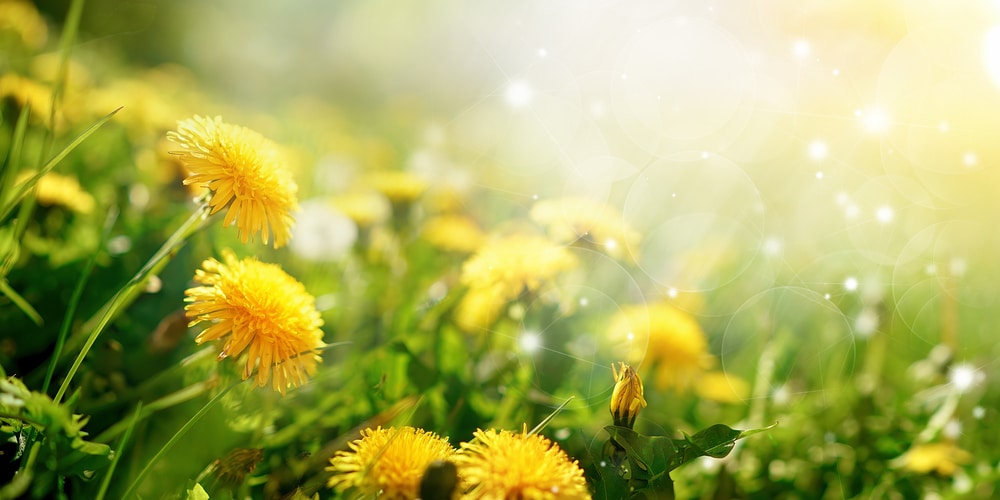Most gardeners know how annoying weeds can be. Indeed, weeds might disrupt your lawn and your plants’ growth. Many people would suggest removing them as soon as you notice their presence.
However, some weeds look cuter than others. And what can you do about that? For instance, you might be familiar with the bright yellow dandelions that transform lawns into pools of colors.
Dandelions flower in March and are rich in pollen and nectar. But do bees like dandelions? Read this essential guide to find out!
Do Bees Like Dandelions?

Let’s get things straight: bees love dandelions, which provide them with the appropriate amount of proteins and carbohydrates. And since honeybees need some protection, people advise against pulling out dandelions from their gardens.
While that might be extreme (after all, you can plant other species that are not as invasive and attract bees), it gives a sense of the relationship of these insects with the wildflowers.
Dandelions start appearing in March when bees emerge from hibernation and are hungry for nutrients. The bright yellow flowers contain most nutrients bees (and other pollinators) need to survive.
However, they lack vital amino acids, meaning bees have to look for other food sources. For instance, other suitable options include pollen from maple, willow, and most fruit trees.
So, if you decide to pull dandelions, you shouldn’t worry too much about the bee population. Of course, there are other plants available to bees around the same time.
However, avoid spraying dandelions with herbicides to remove them: that will harm the bees (and might even damage humans). If you don’t like having dandelions in your garden, pull them or mow them.
However, sometimes, cutting them out (like pruning) might stimulate new growth, meaning you might have to repeat the process often during the flowering season.
What Do Bees Like the Most?
For bees, as with most species, variety is crucial. A balanced diet will make them healthier and less susceptible to diseases. For this reason, these insects will collect pollen from various sources.
However, most of the time, bees will prefer less challenging options. Even if there might be more nutritious types of pollen around, these insects’ choices have to do with the ease they can collect their food.
Of all the bee species, bumblebees seem to be the more selective. They prefer high-quality pollen and won’t settle for getting food from plants that won’t meet their nutritional needs. Of course, as with most living beings, if there isn’t anything better, they will adapt to what’s available.
So, to keep the story short, it is not that easy to say what plants bees prefer. Violets, Erica, Pulmonaria, chickweed, maple, willow, and Oregon grapes attract most bee species, who love to hang around these plants.
What Other Pollinators Do Dandelions Attract?
Dandelions’ vivid colors attract plenty of pollinators. Besides honey bees, hoverflies, butterflies, and hummingbirds also like dandelions. Of course, several species of bees will visit dandelions.
However, it is worth mentioning that they will most likely get pollen from dandelions in the absence of other options. For instance, with fruit trees around, most pollinators will get to them.
Some beneficial beetles (those who feed on aphids) also enjoy dandelions. So, it might be ideal to leave such weeds on your fields to protect your vegetables. Use your logic, though: if it seems dandelions are spreading too fast, it might be time to start removing them before they compete with nutrients with your veggies.
Interestingly, dandelions can self-pollinate, so they don’t need visits to reproduce. Still, some help from pollinators will aid them in spreading faster (and at higher distances).
You may not know this, but dandelions have been around for millions of years and are sources of food and medicine for some indigenous people, who still practice traditions that are centuries old.
Are Dandelions Crucial for Bee’s Survival?
Recently, dandelions are getting the reputation of being crucial in bee survival. However, as you might know by now, they aren’t a primary (or sole) food source for these insects. Still, that doesn’t mean they could be part of their diet.
To limit damages, avoid using herbicides on the weeds in your garden. While they might be effective at removing the annoyance, they may kill bees approaching your garden. And that’s something you should avoid since bees are becoming more precious every day.
Related Article: Does Weed and Feed Kill Bees?

